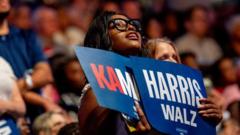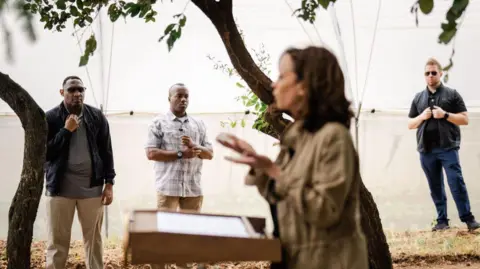On an unusually warm fall morning at the University of Michigan in Ann Arbor, a diverse group of students formed a long line at the early voting center, eager to cast their votes in the upcoming election. Among them, Keely Ganong, a third-year student, shared her enthusiasm for voting for Kamala Harris, citing her as a role model for women's leadership: "She’s just a leader that I would look up to to represent my country." Ganong’s classmate, Lola Nordlinger, echoed that sentiment, highlighting the importance of personal choice in the conversation about abortion rights. "A woman’s choice is something that’s so personal to her, and it really should be no one else’s decision."
As election day approaches, discussions around voting are prevalent across the campus. Adrianna Pete, a 24-year-old volunteer, remarked, "I feel like a lot of women are rising up," reinforcing the increasing political engagement among young women, a demographic crucial to Harris’s electoral strategy. A recent Harvard Institute of Politics poll shows Harris leading among women aged 18 to 29 by a significant 30 points. Moreover, a focused survey found her leading by 38 points among college students, regardless of gender.
In light of the razor-thin margins in battleground states like Michigan, Harris is banking on youth turnout to secure her candidacy. Hannah Brocks, 20, who actively campaigns with the school’s young Democrats club, underlined the connection she feels with Harris: "It’s just so much love and empathy in the way she talks about other people." Drawing parallels to the previous election in 2020, where 10 million more women voted than men, polls indicate that early results follow similar patterns, with approximately 55% of early voters being women.
However, the voting landscape is complex, particularly among white women. Harris's significant lead among young non-white women under 30 contrasts starkly with her diminished support among older white women, where her advantage shrinks considerably. Polls from the last election cycle reveal challenges Democrats face with white, non-college educated voters, meaning Harris must engage a broader range of women to sway the electoral outcome.
The stakes are particularly high in Arizona, where a significant abortion rights ballot question could energize female voters. Voter Mary Jelkovsky expressed how personal the issue has become, noting how conversations about abortion rights have surfaced within her family since the Supreme Court overturned Roe v. Wade. "For us [women], this election couldn’t be more important," she stated, reflecting the gravity of the current political climate.
Harris’s campaign is strategically leveraging the abortion issue, aiming not only to galvanize her supporters but also to sway women who may traditionally vote Republican. Voter Rebecca Gau emphasizes a shift in her political identity since Trump's presidency, expressing excitement for voting for Harris, indicating a broader disillusionment with "toxic masculinity."
Yet, all Republican women are not in agreement. Tracey Sorrel, a member of the BBC's Voter Panel, expressed skepticism about Harris's stance on abortion rights, reinforcing that policy rather than personality will guide her vote. "I'm not voting personality. I'm voting policy. I don't have to marry the man," Sorrel said.
As the election nears, both campaigns furiously chase the elusive young female vote, recognizing its potential to tip the electoral balance.






















